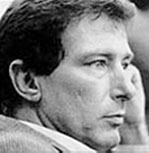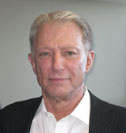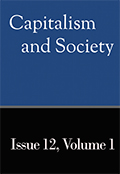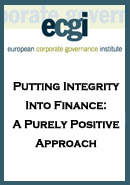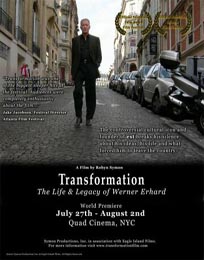Papers and Articles
PAPERS
Putting Integrity Into Finance: A Purely Positive Approach: ('positive' as used here is as it is used in the sciences – it does not mean something good or desirable, it means the way integrity actually is and operates) by Werner Erhard and Michael C. Jensen
Published in the Journal: Capitalism and Society by Columbia University's Center on Capitalism and Society
"Behavior that lacks integrity leads to value destruction. This paper analyzes some common beliefs, actions, and activities in finance that are inconsistent with being a person or a firm of integrity. Each of these beliefs leads to a system that lacks integrity, i.e., one that is not whole and complete and therefore creates unworkability and destroys value. Focusing on these phenomena from the integrity viewpoint, the authors argue, makes it possible for managers to focus on the value that can be created by putting the system back in integrity and correcting the non-value maximizing equilibrium that exists in capital markets. Overall, this paper summarizes a purely positive theory of integrity that has no normative elements whatsoever, and demonstrates how it applies to both individuals and organizations. In effect, integrity is a factor of production just like knowledge, technology, labor, and capital, but it is undistinguished—and its affect (by its presence or absence) is huge."
This paper is featured in its working drafts at:
Harvard Business School NOM Unit Working Paper No. 12-074, Barbados Group Working Paper No. 12-01 European Corporate Governance Institute (ECGI) – Finance Working Paper No. 417/2014
And also available for Download at the National Bureau of Economic Research (NBER) and Harvard Law School Forum on Corporate Governance and Financial Regulation
Hunger Project Source Document Document written to describe the contextual shift in perspective inspiring the creation of the international non-profit, The Hunger Project
A New Model of Integrity: An Actionable Pathway to Trust, Productivity and Value "We present a positive model of integrity (positive as used here does not mean something good or desirable, it means the way something actually is) that, as we distinguish and define integrity, provides powerful access to increased performance for individuals, groups, organizations, and societies."
Being a Leader and the Effective Exercise of Leadership: An Ontological Model Written in collaboration with Harvard Business School Professor Michael C. Jensen, Steve Zaffron and Kari Granger titled “The Ontological Foundations of Leadership and Performance: Being a Leader and the Effective Exercise of Leadership
A New Paradigm of Individual, Group and Organizational Performance, Werner Erhard and the Barbados Group - The Barbados Group members are: Sir Christopher Ball, Peter Block, Allan L. Cohen, Joseph J. DiMaggio, Werner Erhard, Bruce Gregory, Michael C. Jensen, Olga Loffredi, David C. Logan, Brian Regnier, Robert H. Rosen, Harry Rosenberg, Allan L. Scherr, Steve Zaffron, Michael E. Zimmerman, Mark A. Zupan.
Creating Leaders: An Ontological / Phenomenological Model, Werner Erhard, Michael C. Jensen, Kari L. Granger, (October 2010). Harvard Business School NOM Working Paper No. 11-037; Barbados Group Working Paper No. 10-10; Simon School Working Paper No. FR-10-30. Available at SSRN, In: THE HANDBOOK FOR TEACHING LEADERSHIP, Scott Snook, Nitin Nohria, Rakesh Khurana, eds., Sage Publications, 2011.
Course Materials for Being a Leader and the Effective Exercise of Leadership: An Ontological/Phenomenological Model: "This leadership course is designed to leave students being leaders and exercising leadership effectively as their natural self-expression – rather than attempting to learn the characteristics, styles, and skills of noteworthy leaders, and then trying to remember and apply them where appropriate.
The course is not designed to merely leave the students with knowledge (that is not designed to leave students “knowing” about leaders and leadership and able to cogently discuss the issues surrounding leader and leadership). Rather, the course is designed to give students actual access to being a leader and the effective exercise of leadership. Our promise to the students is that if they honor their word to fulfill the requests we make of them they will leave the course being leaders and exercising leadership effectively."
How Language Shapes the World: A New Model Providing Actionable Access to the Source of Performance: Erhard, Werner, 2008; "...language gives one access to the way in which what one is dealing with occurs for one, with which action (and therefore performance) is naturally, necessarily closely connected (mutually arising)."
Creating Leaders: An Ontological/Phenomenological Model THE HANDBOOK FOR TEACHING LEADERSHIP, Chapter 16, Scott Snook, Nitin Nohria, Rakesh Khurana, eds., Sage Publications, 2011. "The sole objective of our ontological/phenomenological approach to creating leaders is to leave students actually being leaders and exercising leadership effectively as their natural self-expression. By “natural self-expression” we mean a way of being and acting in any leadership situation that is a spontaneous and intuitive effective response to what one is dealing with."
The Hidden Power of Integrity and Access to Vast Increases in Performance A large amount of the damage inflicted on people and organizations is caused by actions of individuals that are not in their own self interest. That is, each and every person consistently imposes costs on themselves, their loved ones, friends, associates, partners, employers, employees, and the public by actions that are not in their own self interest. And all this is invisible to each of us.We focus here on these invisible integrity issues that cause huge problems in our lives and to everyone we come in contact with. We present a new model of integrity that will provide you powerful and actionable access to increased performance for yourself, your family and groups, and your organizations. This new model reveals the causal link between integrity and increased performance, quality of life, and value-creation for all entities, and provides access to that causal link. Integrity as we will define it is thus a factor of production as important as knowledge and technology, yet its major role in productivity and performance has been largely hidden or unnoticed, and therefore ignored and unmanagable by leaders, managers, politicians, economists and others.
Four Ways of Being that Create the Foundations of A Great Personal Life, Great Leadership and A Great Organization We argue here that the four ways of being we identify as constituting the foundation for being a leader and the effective exercise of leadership can also be seen as the foundations not only for great leadership, but also for a high quality personal life and an extraordinary organization. One can see this as a “value free” approach to values because, 1) integrity as we define it (being whole and complete) is a purely positive phenomenon, 2) authenticity is also a purely positive phenomenon (being and acting consistent with who you hold yourself out to be for others and who you hold yourself to be for yourself), 3) being committed to something bigger than oneself is also a purely positive phenomenon (that says nothing about what that commitment should be other than it be bigger than oneself), and 4) being cause in the matter as a declaration of the stand you take for yourself regarding everything in your life is also a purely positive phenomenon. "positive” as used here is as it is used in the sciences – it does not mean something good or desirable, it means the way integrity actually is and operates
Harvard Business School Working Paper Series
PRESENTATIONS
Discussion With Werner Erhard and Professor Jonathan D. Moreno: University of Pennsylvania Bioethics Film Festival, April 2016 (note: scroll down to second video on page to view)
Creating Leaders: A New Model - Ten Years On: University of Rochester Simon Business School: Sands Leadership Lecture, February 5, 2014
Creating Leaders: A New Model: New York University, New York, N.Y, November 2013
Slideshow Presentation - A New Model of Integrity: An Actionable Pathway to Trust, Productivity and Value Written in collaboration with Harvard Business School Professor Michael C. Jensen titled “Integrity: A Positive Model that Incorporates the Normative Phenomena of Morality, Ethics and Legality”
Slideshow Presentation - Integrity: Where Leadership Begins - A New Model of Integrity: Presented at the Center for Public Leadership, John F. Kennedy School of Government, Harvard University, Boston, Ma., May 10, 2007
Epistemological And Contextual Contributions of est to General Systems Theory: Presented to the symposium on Evolving Trends in General Systems Theory and the Future of the Family at the Sixth World Congress of Social Psychiatry, Opatija, Yugoslavia, 5 October 1976
A Shot Heard Round The World: Creating a Context for a World That Works: In 1980 Werner Erhard delivered a presentation with Buckminster Fuller on creating a context for a world that works. This excpert for the January 1980 Granduate Review discusses the event.
CONVERSATIONS WITH WERNER ERHARD
Werner Erhard Interviews 60 Minutes’ Mike Wallace on The Art of an Interview
Exercising Creative Leadership in Society – An Interview with Robert Reich
James Burke – Werner Erhard Interviews Distinguished BBC Producer and Creative Educator on Chaos and Order in Our Lives
Milton Friedman – Werner Erhard Interviews Winner of the 1976 Nobel Prize in Economics
Alice Cahana – Werner Erhard Interviews World Renowned Artist who Celebrates Life Inside of the Holocaust Experience
Werner Erhard Interviews Financial Journalist Andrew Tobias
Werner Erhard discusses the Leadership Course (Being a Leader and Exercising Leadership: An Ontological / Phenomenological Model)
ARTICLES
Revision : Werner Erhard on Transformation and Productivity: An Interview: A discussion of the art and discipline of transformation in the workplace and in life; an interview with Werner Erhard
est: Communication in a Context of Compassion: (1979) Werner Erhard and Victor Gioscia, Ph.D. write about the est Standard Training (est)
Outcome Study by Robert Ornstein, Ph.D.,Charles Swencionis, Arthur Deikman, M.D., Ralph Morris, M.D.: In early 1974, an exhaustive survey (680 items) was completed by 10.5% of the est graduate population. The survey asked graduates to report their experience of health and well-being after the est training and their experience of health and well-being the year before the training. Respondents reported strong positive health a nd well-being changes since takingthe est Standard Training, especially in the areas of psychological health and well-being.
Abstract of Study: The Children of est: A study of the experience and percieved effects of a large group awareness training (the Forum) by Charles W. Denison, November 1994
Report on The est Training: by Humberto Maturana
est- A Philosophical Appraisal: by Michael Zimmerman
Assessment of the Philosophical Significance of the est training: by Hubert Dreyfus
Scene magazine - Interview with Werner Erhard: An interview in San Francisco's Scene Magazine with Werner Erhard in 1982.
Breaking Out of The Box: by Debra Feinstein, Benchmark Magazine - A Xerox publication.
Create Breakthroughs in Performance By Changing The Conversation: by Perry Pascarella," In his work to develop an approach to performance that will predictably produce breakthroughs, Werner Erhard says, 'If you seriously examine any action, you find there are always two sides of it: the side from which you can explain it and the side from which you can produce it....In individual and organizational performance, most of us attempt to produce action by working in the after-the-fact realm of description, analysis, explanation, and prescription. Rarely do we consider that producing an action requires a whole different way of looking at it. If youwant to have a dramatic impact on performance, you need access to the source of action.'"
The Three Laws of Performance in Manufacturing - Industry Week: With one action that took less than a minute, a manger transformed how steelmaking occurred to the mill workers, and in so doing, altered their performance -by Steve Zaffron, CEO, Vanto Group and Dave Logan,Partner, CultureSync
Create a Bigger Picture of Health The "participation" that Werner Erhard talks about is participation in relationships and participation in work that serves a vision or a context larger than your own personal survival. Your health and wellness are by-products of a life that is focused and ripe with meaning, full of generous engagement with others in the creation of a world that works for everybody. -From an ongoing series of columns entitled Simply Well by John W Travis MD, MPH
Harvard Business School First Look at A New Paradigm of Individual, Group and Organizational Performance
Harvard Business School Working Knowledge, December 3, 2010
“You Don’t Alter What You Know, You Alter the Way You Know It: Conversation with Werner Erhard about The est Training, Philosophy, ‘Enlightenment,’ Authoritarianism and Legitimate Authority, Arrogance, Leadership and Vision”, The Network Review, Northeast Edition, Volume 1, Number 4, September 1983.
Interview with Michael Jensen on Integrity: interview by Karen Christensen on the topic of integrity. "There is confusion between integrity, morality and ethics. My co-authors, Werner Erhard and Steve Zaffron and I, distinguish integrity, from morality and ethics in the following way. Integrity in our model is honoring your word. As such integrity is a purely positive phenomenon. It has nothing to do with good vs. bad, right vs. wrong behavior. Like the law of gravity the law of integrity just is, and if you violate the law of integrity as we define it you get hurt just as if you try to violate the law of gravity with no safety device. The personal and organizational benefits of honoring one's word are huge -- both for individuals and for organizations -- and generally unappreciated.
Harvard Business Review: How to Fix Misunderstandings at Work and in Life: Dan Palotta discusses some principles from The Three Laws of Performance, written by Steve Zaffron and Dave Logan, drawn from Werner Erhard's new Paradigm for Performance
The est Experience: from Powers of Mind Part II,, by Adam Smith
The Heart of The Matter What is Transformation? Werner Erhard answers that question in this article from 1984.
est in Prison by Earl Babbie, This article presents an initial evaluation of the use of the Erhard Seminars Training (est) in the prison system.
The est Training in the Prisons A basis for the Transformation of Corrections: by Mark Woodard
Interview with Werner Erhard 1976 Interview with Werner Erhard by John Johns, "What is, is, And what isn't isn't"
Integrity is a Strange Loop A Review by Law Professor Jeffery Lipshaw of “Integrity: A Positive Model that Incorporates the Normative Phenomena of Morality, Ethics and Legality”
Top Ten - Legal Ethics & Professional Responsibility Weekly Top Ten: SSRN Legal Ethics & Professional Responsibility
est: Communication in a Context of Compassion The purpose of the est training is the transformation of the ability to
experience living, so that the situations one is trying to change or is putting up
with clear up just in the process of life itself.
In Training, Free Choice is the Key Effective training must recognize and build on the contribution that each worker already makes while providing the opportunity to move even further ahead.
The Mind's Dedications to Survival The purpose of this report is to discuss some observations and conclusions relative to the mind's dedication to survival, a central theoretical concept in the est training.
The est Standard Training by Werner Erhard and Victor Gioscia, in which the est Standard Training is described.
Ethiopia 1988: A Remarkable Achievement
Some Aspects of the est Training and Transpersonal Psychology a discussion with Werner Erhard and James Fadiman, lecturer, author, and past president of the Association for Transpersonal Psychology
Satisfaction Is The Key: The mind's function is survival. So, one's mental processes are toward survival. That is the purpose of mental processing. It can get very esoteric, but its fundamental purpose is towards survival. And because it is a construction of the mind, the mind sees that the accumulation of stuff equals survival. Therefore, there's a concept of the mind that more is better. Our mental processes say more is better. If I get you to love me a little bit, more is better. If I'm a little happy, I ought to be more happy. How about food? Well, I can only eat this much. But you can never tell about tomorrow, more is better!
So, we have an entire system of civilization based on the notion that more is better. Our mental process is not towards sufficiency or enough but is always towards more, so that if you fill your needs your mind says, "Fill them some more." When you fill them some more the mind says "some more."...
So, we have the entire system of civilization based on the notion that more is better.
There's another alternative, and that is to move from a system in which the only possible conclusion is that more is better into another system that says enough is best, that to be satisfied is enough.
Werner Erhard on Transformation and Productivity: An Interview a discussion not only of transformation in the workplace, but of the art and discipline of transformation itself
Being Well "Our intention in the following essay is to offer the reader an opportunity to reflect on an issue which is central in our time—the search for a new paradigm—a profound new definition of human well being." (View document at scribd.com)
Werner Erhard and Other's Scholarly Papers
Business Daily Africa: Sharing Personal Problems Spurs Success at Work
An Interview with Werner Erhard from PSA Magazine, 1976
Question: "You say that people are dissatisfied because they think they have what they want but they find that they're not really experiencing it. What are the barriers to their experiencing it?"
Werner Erhard: "The simplified answer is that people seem to exist in three parts. We have the outer part, which is the thing we put together to survive in life - our persona, our ego. This best-foot-forward face. Underneath that we're trying to hide, particularly from ourselves, the person we're afraid we might be: small -thinking, frightened, concerned about our own survival, pretending arrogant. So we put on the face, and underneath that is the thing we're afraid we might be. Some of us put on the face so successfully that we don't even know this person we're afraid we are.
Underneath that is the self. So the barrier to the experience of who we are is the unwillingness to confront who we are afraid we are, or dramatizing who we are afraid we are. You see, some people are acting out their fear of who they might be. That is the simple answer." (excerpt)
Research on the Benefits of The est Training, Earl Babbie
Werner Erhard's est Training in the Prisons, Mark Woodard
Werner Erhard's Trip To Moscow in 1990: "Werner Erhard's work is especially important to us because we are standing at the threshhold of very big changes. Our harsh determinism is so deeply embedded in us that the thinking of Werner Erhard about, for example, the need to make mistakes, we at first hear as heresy. But later, it is possible to see this as luminously true and valid. This is a very empowering perspective."
U.E Sushilov, general director, machine building factory
Humankind Must Find A New Self-Awareness: USA Today published an interveiw with Werner Erhard in 1982 which still rings true today - USA TODAY: "You have been calling on people to take responsibility for their own lives. How is that possible when there are forces - inflation, unemployment and nuclear armament - over which they have no control?" -- Werner Erhard: "We don’t mean that people are at fault for, to blame for, or should feel guilty about their circumstances. It’s possible to create for oneself a context of responsibility. Life presents circumstances no one of us has complete control over. But in a context of responsibility, I would say, for instance, about the recession: “I can be responsible for the quality of my life in this recession. I can do something about the circumstances I find myself in. I’m not powerless or a victim.” A context gives one the opportunity to think creatively, rather than to think only reactively. It is not a justification, an explanation or a prescription. A context is a place from which you approach the circumstances of life. One then can deal with life from a sense of some personal effectiveness."
A Way to Transformation: The subject of this article is transformation – a deep, profound and committed choice about the way we live our lives. Transformation is the possibility for a breakthrough in our living, a clearing for aliveness to show up in our everyday activities, self-expression and commitments. Talking about transformation is no more than a representation, an image of the real thing. It’s like eating the menu instead of the steak – neither nurturing nor profound. It is in being transformed – in being authentically true to oneself – that one lives passionately free, unencumbered, fearless, committed. It is in living life in a transformed way that the steak and its sizzle show up. I invite you to be here for the actual benefits of transformation, for the meal – not the menu. - from The Heart of The Matter, Werner Erhard, 1984
Life, Living and Winning the Game: Living is really pretty simple. Living happens right now; it doesn’t happen back then, and it doesn’t happen out there. Living is not the story of your life. Living is the process of experiencing right now. Thinking about right now, figuring it out, perceiving it, arguing, reading about or believing anything about right now – none of these produce any certainty about living.
When you get beyond the symbols and beliefs about now, beyond thinking about it, beyond efforting or working at it, when you get even beyond merely feeling it, when you get all the way up to observing it, being with it, and finally up to totally experiencing it, the uncertainty about living goes away, because you know the truth in the only way in which a being ever knows the truth – by direct experience.
Celebrating Your Relationships: from a presentation by Werner Erhard as described in The Graduate Review, Sept. 1978 -
In the ordinary course of events, in order to bring something about, you need to establish a process. In other words, in order for me to get from here to here, I can’t do it all at once. I have to do it one step at a time and by handling it one step at a time, I can, as a matter of fact, be from here to there. So all I need to do is to be willing to establish a process, to manufacture a process – to produce a process. And by a process I can, in fact, accomplish something. Now, that’s the ordinary space in which we live.
The Possibility of Relationship: Presentation delivered on August 11, 1984 by Werner Erhard - audio on YouTube
The Heart of The Matter: Presentation by Werner Erhard delivered in 1984 - audio on YouTube
Hayek: A Collaborative Biography: Part 1 Influences from Mises to Bartley: edited by Robert Leeson, Professor of Economics at Stanford University - Chapter 12 Bill Bartley, Biographer Extraordinary written by Werner Erhard. "Fifteen scholars have collaborated to provide a comprehensive analysis of the life and work of one of the most influential economists of all time. The authors include the Official Historian of the Reserve Bank of Australia (Selwyn Cornish), the Director of the von Mises Institute (Douglas French), Hayek's second General Editor (Stephen Kresge), the founder of est (Werner Erhard), plus seven Professors - of Economics (David Laidler, Viktor Vanberg and Robert Leeson), Economic History (Avner Offer and Jan-Otmar Hesse), Politics (Melissa Lane) and Social Policy (Nils Goldschmidt). The Universities represented include Stanford, Princeton, Oxford, Bielefeld, Western Ontario, Uppsala and Freiburg. This is the first time that such a distinguished collection of scholars – from a variety of perspectives – have attempted to integrate Hayek's life, work and influence on world history with the archival evidence."
Insigniam Quarterly: The four ways of being that create the foundation for great leadership, a great organization, & a great personal life
Further Reading
BOOKS
Impromptu Man,by Jonathan D. Moreno, a biography of J.L. Moreno (The author interviewed Werner Erhard for his section on The est Training)
Leaders: The Strategies for Taking Charge, by Warren G. Bennis and Burt Nanus, New York: HarperCollins, 2003.
Community: The Structure of Belonging, by Peter Block, Berrett-Koehler Publishers, May 1, 2008.
Inventing Reality: Physics as Language, by Bruce Gregory. New York: John Wiley & Sons, Inc., 1990. by Bruce Gregory. New York: John Wiley & Sons, Inc., 1990.
The Three Laws of Performance, by Steve Zaffron and Dave Logan
Werner Erhard:The Transformation of a Man, The Founding of est, a biography by William Warren Bartley, III
|

